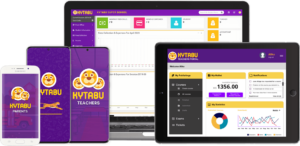Fariha Raisa, Feedback Labs | September 26, 2021
“For Africa, children are both our future, and our present. And technology is their biggest ally.”
What is the best way to impart learning? How can we ensure measurable success for the students? KYTABU believes that technology and data-driven decisions could be the answer by which institutions can positively impact learners; when students are well equipped with the right localized and relevant learning resources, their chances of success get exponentially higher.
Founded in 2012, KYTABU exists to enable African learning institutions and students to leverage education technology platforms and content to meet their learning objectives. KYTABU provides education technology solutions and relevant digital content to African learning institutions and their students to support their learning objectives. It uses a mobile-first learning management system with digital content for students that is affordable, accessible, and relevant to them.
provides education technology solutions and relevant digital content to African learning institutions and their students to support their learning objectives. It uses a mobile-first learning management system with digital content for students that is affordable, accessible, and relevant to them.
With the purpose of introducing digital interventions to teaching, KYTABU launched a tool called Kibanda (Swahili for Hut) for creating a teacher community on mobile devices and completing the feedback loop for teachers in Kenya. Recently, they came to LabStorms to discuss challenges around this app. Conversations were centered around reducing the friction to make the app a standard using tool, the best ways to collect sensitive professional data from teachers and use that data to influence top-level policy decisions.
Key Takeaways:
- Making tech like Kibanda the norm. As KYTABU aims to make Kibanda a standard tool in education, attendees raised the concern of having too many features. If the app is too complex, the teachers might struggle to grasp its use. It was advised to simplify things at the beginning to get traction. Then the features could be gradually added. Furthermore, attendees recommended writing down the top 6 important goals to strategically increase the use of the app. Furthermore, the importance of creating avenues for educators to connect with each other was emphasized to increase the app’s usage.
- Listening to the teachers. To learn the best ways to collect data from teachers, KYTABU asked for recommendations and best practices for collecting sensitive information. LabStorm attendees emphasized building trust with parents and teachers to make communities feel more comfortable using the app. Along with cultural sensitivity, attendees stressed the importance of keeping identifiable user data safe and private. Participants also ideated using the platform as the data generator to help teachers back up their arguments with statistics and strengthen arguments to policymakers. This would be important in gaining the trust and support of the teachers. LabStorm participants also recommended teachers be kept in the loop about the data collected by the app, steps taken to ensure privacy is respected, and that relevant best practices are observed.
- They are influencing policy decisions. To use the data from the platform in the community-wide decision-making, attendees advised leveraging the power of the teacher’s unions. Teachers might already be in contact with officials concerned with educational policies. Hence, creating buy-in amongst those groups could help reduce the friction and ensure that the app is a standardized part of that organization so teachers can better upvote this particular platform. Consequently, building relationships or at least buy-in amongst these organizations or leaders may better position KYTABU for other policy opportunities.
With the suggestions from the attendees, KYTABU concluded by aiming to build trust among the app users to bridge the connection when people are hesitant or fearful of using new technology. They will also be focusing on getting teachers to be heard through the platform and present opportunities to engage with each other. Another key takeaway from the session was to keep the platform simple. Teachers should understand what the technology is offering, which will help build trust with teachers and policymakers.
If you have a great idea for KYTABU to better connect with the community it serves, please reach out to [email protected]!
Learn More About the Presenter
Tonee Ndung founded KYTABU in 2012. KYTABU exists to enable African learning institutions and students to leverage education technology platforms and content to meet their learning objectives. He believes technology can help institutions in Africa make better data-driven decisions, placing them in a better financial and educational position to positively impact learners. He knows when students are well equipped with the right localized and relevant learning resources, their chance of success is exponentially higher.
Learn more about Feedback Tools Accelerator Fellow Tonee Ndung
Learn More About KYTABU
KYTABU provides education technology solutions and relevant digital content to African learning institutions and their students to support their learning objectives. KYTABU deploys a mobile-based information management system for learning institutions and a mobile-first learning management system with digital content for students that is affordable, accessible and relevant to them.
Learn More About LabStorms
 LabStorms are collaborative problem-solving sessions designed to help organizations tackle feedback-related challenges or share what’s working well in their practice.
LabStorms are collaborative problem-solving sessions designed to help organizations tackle feedback-related challenges or share what’s working well in their practice.
Presenters leave the experience with honest, actionable feedback and suggestions to improve their feedback processes and tools.
To learn more about participating in a virtual LabStorm, please visit feedbacklabs.org/labstorms. If you are interested in presenting at a future LabStorm, please email [email protected].









